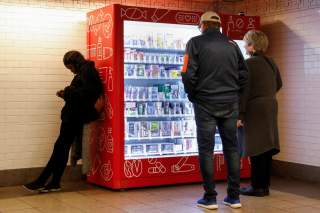Could This Machine Replace Your Local CVS Pharmacy?
Drugs purchased this way not only offer convenience but usually cost less.
The New York Times recently published a disturbing report about life‐threating errors made by overworked pharmacists, many of whom complain of “burnout.” A relatively recent innovation can provide them some needed relief while at the same time improve convenience and reduce costs to consumers, if regulators get out of the way: the pharmacy kiosk. These vending machines contain prescription and over‐the‐counter drugs (but not controlled substances) and have a state‐licensed pharmacist available to consult, on demand, remotely.
The technology has been around for a while. Vending machines have dispensed Plan B emergency oral contraceptive—the so‐called “morning after pill”—on college campuses since at least 2017. Arizona State University and Florida State University installed pharmaceutical vending machines to dispense a wide range of drugs in their Student Health Services buildings back in 2014.
Those vending machines are operated by a company called InstyMeds. Mach 4 Automatisierungstechnik, a German tech firm specializing in automated pharmacy solutions, partnered with a South African firm to provide kiosks in South Africa in 2017.
The Canadian‐based company MedAvail has been installing vending machines across the U.S., Canada, and Switzerland. Last year the company installed a kiosk inside Jacksonville, Florida’s Memorial Hospital, making it the first hospital in Northeast Florida, and the second hospital in the state to install a kiosk. This is very helpful to patients who are discharged from the hospital or the emergency department and need to fill prescriptions. They can get them immediately filled without having to travel to and/or wait for a pharmacy to open when they are still weak and unwell.
The vending machines generally stock a generous supply of the most commonly prescribed drugs but avoid stocking controlled substances. The kiosks have a digital address to which prescribers can e‑prescribe. Customers enter identification, insurance information, and can pay with credit/debit cards or cash. The kiosks have a pharmacist on call to oversee the dispensing by the machine and to answer questions from patients.
Drugs purchased this way not only offer convenience, but usually cost less. The staffing and other overhead expenses incurred by brick and mortar pharmacies are avoided, enabling the kiosks to sell at lower cash prices. Like ATM machines, kiosks provide convenience and privacy to customers. There is evidence that they also improve outpatient adherence to primary medication—which lowers overall health care costs by reducing return visits to the doctor’s office or worse, admissions to the hospital.
Despite the convenience and cost savings that kiosks offer to customers, the idea has received pushback in many jurisdictions, largely from state pharmacy boards. Pharmacy boards argue that patients won’t get the necessary supervision from a pharmacist that they receive when they pick up their prescription at a brick and mortar pharmacy. However, the kiosks are contracted with state‐licensed pharmacists who oversee the dispensing of the drugs and offer their consultative services to the customer remotely on the kiosk screen. They can also inquire about other medications the patient may be taking to avoid drug interactions.
As more kiosks proliferate, there might also be pushback from big pharmacy retailers, to whom the kiosks might present a disruptive threat similar to the threat Redbox and Netflix presented to Blockbuster Video. The retailers can always respond to the competition by expanding services and products to attract more customers. (One example: all 50 states and the District of Columbia allow pharmacists to perform vaccinations—a service that kiosks cannot provide.) And pharmacy retailers can branch out into the kiosk business as well, particularly in areas where construction of new stores might be less economically feasible. There will always be a market niche for people who prefer cheaper, more convenient, no frills prescription drugs, and it should not be stifled. Patients should be free to make that choice.
Some states, such as Florida, permit pharmaceutical kiosks, but restrict them to hospitals, long‐term care facilities, correctional institutions, and hospices. While such facilities usually have a pharmacist in‐house who is available to answer questions, kiosks can provide a pharmacist consultation via remote almost instantly. Furthermore, the kiosk pharmacist is less likely to be distracted and overworked—and therefore less error-prone—than many in‐house pharmacists. A bill before the Florida legislature would permit pharmaceutical kiosks to be more widely available outside of those facilities.
With more than half of America’s pharmacists showing signs of burnout, reluctant state pharmacy boards should recognize the benefits of pharmaceutical vending machines to overworked pharmacists and, more importantly, to overburdened patients.
This story was first published by the CATO Institute.
Image: Reuters

